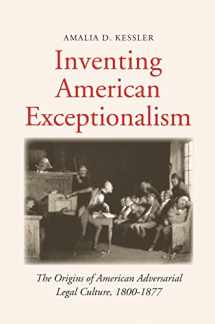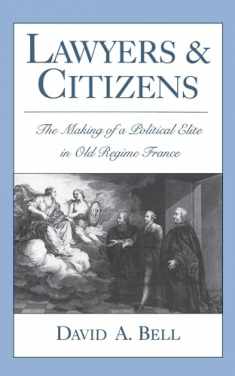
Inventing American Exceptionalism: The Origins of American Adversarial Legal Culture, 1800-1877 (Yale Law Library Series in Legal History and Reference)
ISBN-13:
9780300222258
ISBN-10:
0300222254
Edition:
Reprint
Author:
Amalia D. Kessler
Publication date:
2017
Publisher:
Yale University Press
Format:
Paperback
462 pages
Category:
United States History
,
Civil Procedure
,
Rules & Procedures
,
Americas History
FREE US shipping
Book details
ISBN-13:
9780300222258
ISBN-10:
0300222254
Edition:
Reprint
Author:
Amalia D. Kessler
Publication date:
2017
Publisher:
Yale University Press
Format:
Paperback
462 pages
Category:
United States History
,
Civil Procedure
,
Rules & Procedures
,
Americas History
Summary
Inventing American Exceptionalism: The Origins of American Adversarial Legal Culture, 1800-1877 (Yale Law Library Series in Legal History and Reference) (ISBN-13: 9780300222258 and ISBN-10: 0300222254), written by authors
Amalia D. Kessler, was published by Yale University Press in 2017.
With an overall rating of 3.9 stars, it's a notable title among other
United States History
(Civil Procedure, Rules & Procedures, Americas History) books. You can easily purchase or rent Inventing American Exceptionalism: The Origins of American Adversarial Legal Culture, 1800-1877 (Yale Law Library Series in Legal History and Reference) (Paperback) from BooksRun,
along with many other new and used
United States History
books
and textbooks.
And, if you're looking to sell your copy, our current buyback offer is $0.46.
Description
A highly engaging account of the developments—not only legal, but also socioeconomic, political, and cultural—that gave rise to Americans’ distinctively lawyer-driven legal culture
When Americans imagine their legal system, it is the adversarial trial—dominated by dueling larger-than-life lawyers undertaking grand public performances—that first comes to mind. But as award-winning author Amalia Kessler reveals in this engrossing history, it was only in the turbulent decades before the Civil War that adversarialism became a defining American practice and ideology, displacing alternative, more judge-driven approaches to procedure. By drawing on a broad range of methods and sources—and by recovering neglected influences (including from Europe)—the author shows how the emergence of the American adversarial legal culture was a product not only of developments internal to law, but also of wider socioeconomic, political, and cultural debates over whether and how to undertake market regulation and pursue racial equality. As a result, adversarialism came to play a key role in defining American legal institutions and practices, as well as national identity.
When Americans imagine their legal system, it is the adversarial trial—dominated by dueling larger-than-life lawyers undertaking grand public performances—that first comes to mind. But as award-winning author Amalia Kessler reveals in this engrossing history, it was only in the turbulent decades before the Civil War that adversarialism became a defining American practice and ideology, displacing alternative, more judge-driven approaches to procedure. By drawing on a broad range of methods and sources—and by recovering neglected influences (including from Europe)—the author shows how the emergence of the American adversarial legal culture was a product not only of developments internal to law, but also of wider socioeconomic, political, and cultural debates over whether and how to undertake market regulation and pursue racial equality. As a result, adversarialism came to play a key role in defining American legal institutions and practices, as well as national identity.


We would LOVE it if you could help us and other readers by reviewing the book
Book review

Congratulations! We have received your book review.
{user}
{createdAt}
by {truncated_author}




